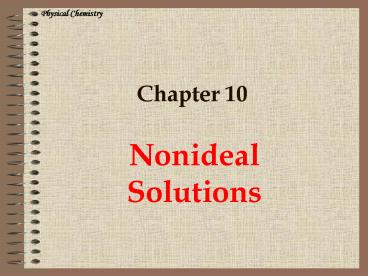Nonideal Solutions - PowerPoint PPT Presentation
1 / 24
Title:
Nonideal Solutions
Description:
very dilute aqueous solution, 25oC. very dilute aqueous solution, 25oC. very ... dilute aqueous solution, 25oC (10.71) at higher concentrations in H2O at 25oC ... – PowerPoint PPT presentation
Number of Views:131
Avg rating:3.0/5.0
Title: Nonideal Solutions
1
Chapter 10
Physical Chemistry
- Nonideal Solutions
2
Physical Chemistry
Nonideal Solutions
Models for Nonelectrolyte Activity Coefficients
Simple Solution
W depends on T and P but not on the mole
fractions.
let z be the number of nearest neighbors of each
molecule in the array. The intermolecular-interact
ion energy is approximated as the sum of
nearest-neighbor interactions.
If ?BB, ?CC, and ?BC are the interaction energies
for adjacent B-B, C-C, and B-C pairs,
respectively.
The energy of mixing
3
Physical Chemistry
Nonideal Solutions
Models for Nonelectrolyte Activity Coefficients
where
For two liquids B and C whose molecules have
similar sizes and shapes,
4
Physical Chemistry
Nonideal Solutions
Models for Nonelectrolyte Activity Coefficients
(Problem 10.4)
simple solution model
Redlich-Kister equation (Margules equation)
(10.32)
5
Physical Chemistry
Nonideal Solutions
Models for Nonelectrolyte Activity Coefficients
Redlich-Kister equation (Margules equation)
(10.32)
simple solution model
6
Physical Chemistry
Nonideal Solutions
Solutions of Electrolytes
Non-electrolyte solutions
The solute is not present as ions
Electrolyte solutions
The solute is ionized and the ions generally
interact strongly with each other.
Numbers of ions in the chemical formula (integers)
Charges of ions in the chemical formula
21 electrolyte
12 electrolyte
22 electrolyte
7
Physical Chemistry
Nonideal Solutions
Chemical Potentials in Electrolyte Solutions
(10.34)
Since ? and ?- are not measurable, define ?i
(the chemical potentials of the electrolyte as a
whole) in solution
8
Physical Chemistry
Nonideal Solutions
Chemical Potentials in Electrolyte Solutions
Similar definition for other partial molar
properties of the electrolyte as a whole.
from
9
Physical Chemistry
Nonideal Solutions
Chemical Potentials in Electrolyte Solutions
Keep T, P, and nA constant and using
On the mole-fraction scale, the chemical
potential of solvent
10
Physical Chemistry
Nonideal Solutions
Chemical Potentials in Electrolyte Solutions
mole-fraction activity coefficient
infinite dilution
On the molality scale, the chemical potentials of
electrolyte
(10.42)
11
Physical Chemistry
Nonideal Solutions
Chemical Potentials in Electrolyte Solutions
Molality-scale mean ionic activity coefficient
(10.41) and (10.43)
12
Physical Chemistry
Nonideal Solutions
Chemical Potentials in Electrolyte Solutions
Stoichiometric molality
(10.49)
define
13
Physical Chemistry
Nonideal Solutions
Chemical Potentials in Electrolyte Solutions
(10.49)
(10.49)
(10.51)
The standard state of i as a whole is taken as
the fictitious state with
has
14
Physical Chemistry
Nonideal Solutions
Chemical Potentials in Electrolyte Solutions
The activity ai of electrolyte i as a whole
Gibbs Energy of an Electrolyte Solution
gives
Gibbs-Duhem Eq.
15
Physical Chemistry
Nonideal Solutions
The Debye-Hückel Theory of Electrolyte Solutions
The Debye-Hückel treatment assumes that the
solution is very dilute.
where
Ionic strength
log of (10.43)
16
Physical Chemistry
Nonideal Solutions
The Debye-Hückel Theory of Electrolyte Solutions
The electrolyte neutrality gives
(10.64)? z
(10.64)? z-
)
17
Physical Chemistry
Nonideal Solutions
The Debye-Hückel Theory of Electrolyte Solutions
very dilute aqueous solution, 25oC
For very dilute solutions, Im is very small
very dilute solution
very dilute aqueous solution, 25oC
18
Physical Chemistry
Nonideal Solutions
The Debye-Hückel Theory of Electrolyte Solutions
Debye-Hückel limiting law
dilute aqueous solution, 25oC
at higher concentrations in H2O at 25oC
19
Physical Chemistry
Nonideal Solutions
Homework
P315-316, Section 10.5
10.16, 10.18
P316, Section 10.6
10.31, 10.32, 10.33
P316, Section 10.8
10.38, 10.39, 10.40
20
Physical Chemistry
Nonideal Solutions
Ionic Association
The equilibrium for ion-pair formation
If no ion pairs were found,
With ion-pair formation,
21
Physical Chemistry
Nonideal Solutions
Ionic Association
Use of the equilibrium condition for the ion-pair
formation (10.72)
Same as (10.37)
22
Physical Chemistry
Nonideal Solutions
Nonideal Gas Mixtures
The activity of a component of a nonideal gas
mixture
The fugacity fi of a component of any gas mixture
(10.95) becomes
effective P
23
Physical Chemistry
Nonideal Solutions
Nonideal Gas Mixtures
The deviation of the fugacity fi of i from the
partial pressure Pi in a gas mixture is measured
by the fugacity coefficient ?i of gas i.
For each component of an ideal gas mixture,
24
Physical Chemistry
Nonideal Solutions
Homework
P317, Section 10.9
10.46, 10.47
P317, Section 10.10
10.50, 10.54, 10.57
P317-318, Section 10.11
10.61, 10.64
P318, General
10.70, 10.71, 10.74































